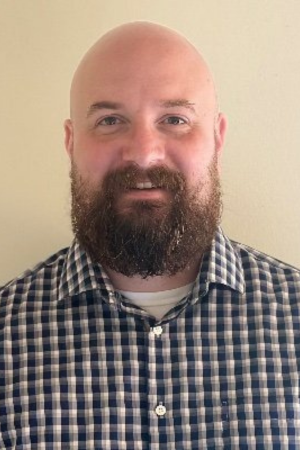
Daniel Vecellio, PhD
- Assistant Professor
- 402.554.2664
- 267 DSC
- Climate change and health, biometeorology, extreme weather
Additional Information
Education
B.S., Meteorology, The Pennsylvania State University, 2011
M.S., Atmospheric Science, Texas Tech University, 2015
Ph.D., Geography, Texas A&M University, 2021Courses Taught
Fall 2024:
GEOG 1050 – Introduction to Human-Environment Geography
GEOG 4320/8326 – ClimatologyResearch Interests
My research studies the links between weather and climate and impacts on human health with a specific focus on extreme heat.
Most recently, I have published work on physiological limits of human tolerance to extreme humid heat and where those limits will be experienced in a warmer world impacted by climate change.
I’m also highly interested in how heat adaptation measures, whether they be physiological, behavioral, or cultural, improve upon health outcomes.
I also have experience working on Arctic climate issues surrounding permafrost degradation and impacts on land-atmosphere interactions in the high latitudes.
Recent Publications
Vecellio, D. J., Huber, M., & Kenney, W. L. (2024). Why not 35°C? Reasons for reductions in limits of human thermal tolerance and their implications. Temperature.
Vecellio, D. J., Lagoa, C. M., & Conroy, D. E. (2024). Physical Activity Dependence on Relative Temperature and Humidity Characteristics in a Young, Insufficiently Active Population: A Weather Typing Analysis. Journal of Physical Activity and Health, 21(4), 357-364.
Wolf, S.T., Cottle, R. M., Fisher, K. G., Vecellio, D. J., & Kenney, W.L. (2023). Heat stress vulnerability and critical environmental limits for older adults. Communications Earth & Environment, 4(1), 486.
Vecellio, D. J., Kong, Q., Kenney, W. L., & Huber, M. (2023). Greatly enhanced risk to humans as a consequence of empirically determined lower moist heat stress tolerance. Proceedings of the National Academy of Sciences, 120(42), e2305427120.
Vecellio, D. J., Vanos, J. K., Kennedy, E., Olsen, H., & Richardson, G. R. (2022). An expert assessment on playspace designs and thermal environments in a Canadian context. Urban Climate, 44, 101235.
Vecellio, D. J., Wolf, S. T., Cottle, R. M., & Kenney, W. L. (2022). Evaluating the 35 C wet-bulb temperature adaptability threshold for young, healthy subjects (PSU HEAT Project). Journal of Applied Physiology, 132(2), 340-345.
Additional Information
Education
B.S., Meteorology, The Pennsylvania State University, 2011
M.S., Atmospheric Science, Texas Tech University, 2015
Ph.D., Geography, Texas A&M University, 2021Courses Taught
Fall 2024:
GEOG 1050 – Introduction to Human-Environment Geography
GEOG 4320/8326 – ClimatologyResearch Interests
My research studies the links between weather and climate and impacts on human health with a specific focus on extreme heat.
Most recently, I have published work on physiological limits of human tolerance to extreme humid heat and where those limits will be experienced in a warmer world impacted by climate change.
I’m also highly interested in how heat adaptation measures, whether they be physiological, behavioral, or cultural, improve upon health outcomes.
I also have experience working on Arctic climate issues surrounding permafrost degradation and impacts on land-atmosphere interactions in the high latitudes.
Recent Publications
Vecellio, D. J., Huber, M., & Kenney, W. L. (2024). Why not 35°C? Reasons for reductions in limits of human thermal tolerance and their implications. Temperature.
Vecellio, D. J., Lagoa, C. M., & Conroy, D. E. (2024). Physical Activity Dependence on Relative Temperature and Humidity Characteristics in a Young, Insufficiently Active Population: A Weather Typing Analysis. Journal of Physical Activity and Health, 21(4), 357-364.
Wolf, S.T., Cottle, R. M., Fisher, K. G., Vecellio, D. J., & Kenney, W.L. (2023). Heat stress vulnerability and critical environmental limits for older adults. Communications Earth & Environment, 4(1), 486.
Vecellio, D. J., Kong, Q., Kenney, W. L., & Huber, M. (2023). Greatly enhanced risk to humans as a consequence of empirically determined lower moist heat stress tolerance. Proceedings of the National Academy of Sciences, 120(42), e2305427120.
Vecellio, D. J., Vanos, J. K., Kennedy, E., Olsen, H., & Richardson, G. R. (2022). An expert assessment on playspace designs and thermal environments in a Canadian context. Urban Climate, 44, 101235.
Vecellio, D. J., Wolf, S. T., Cottle, R. M., & Kenney, W. L. (2022). Evaluating the 35 C wet-bulb temperature adaptability threshold for young, healthy subjects (PSU HEAT Project). Journal of Applied Physiology, 132(2), 340-345.